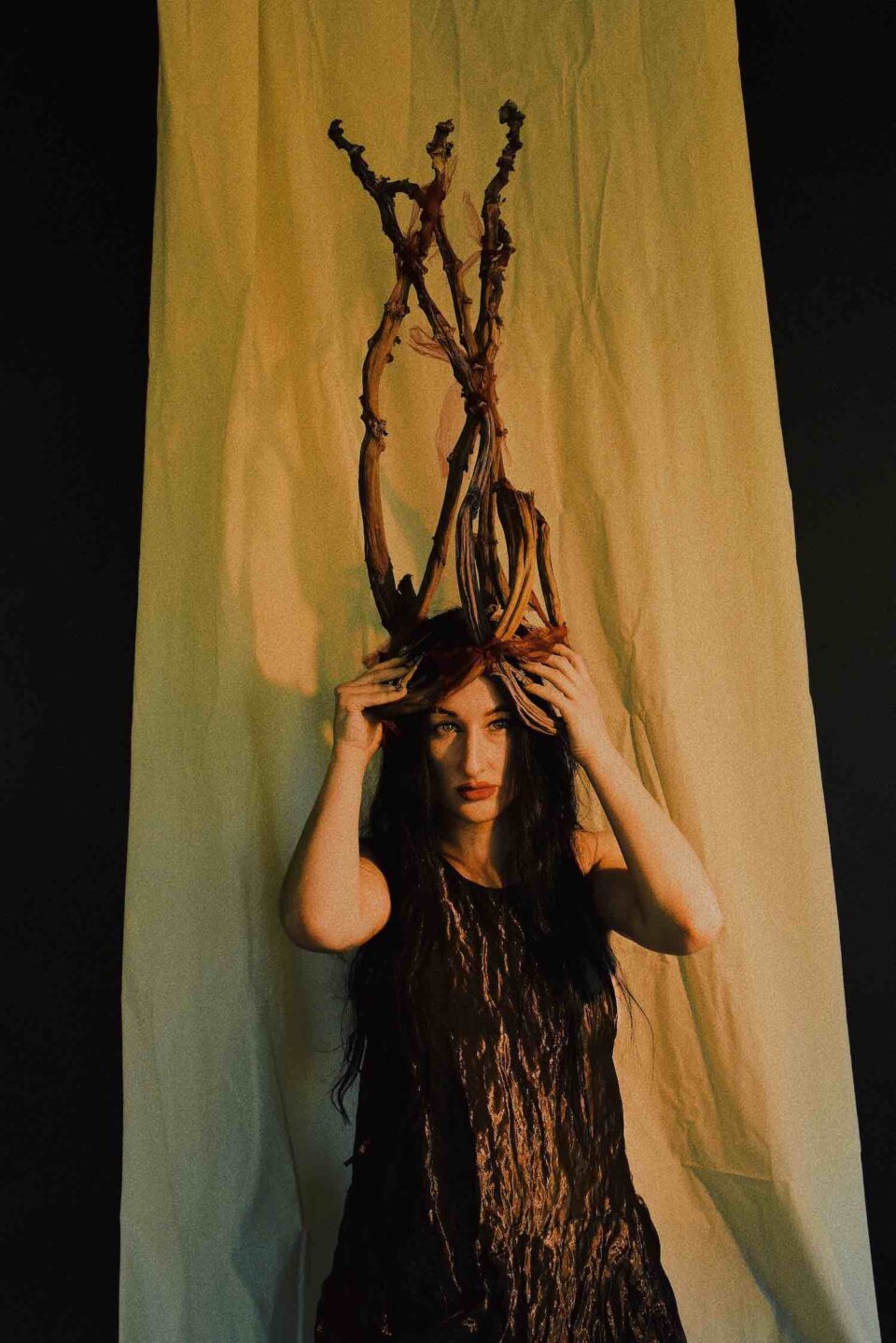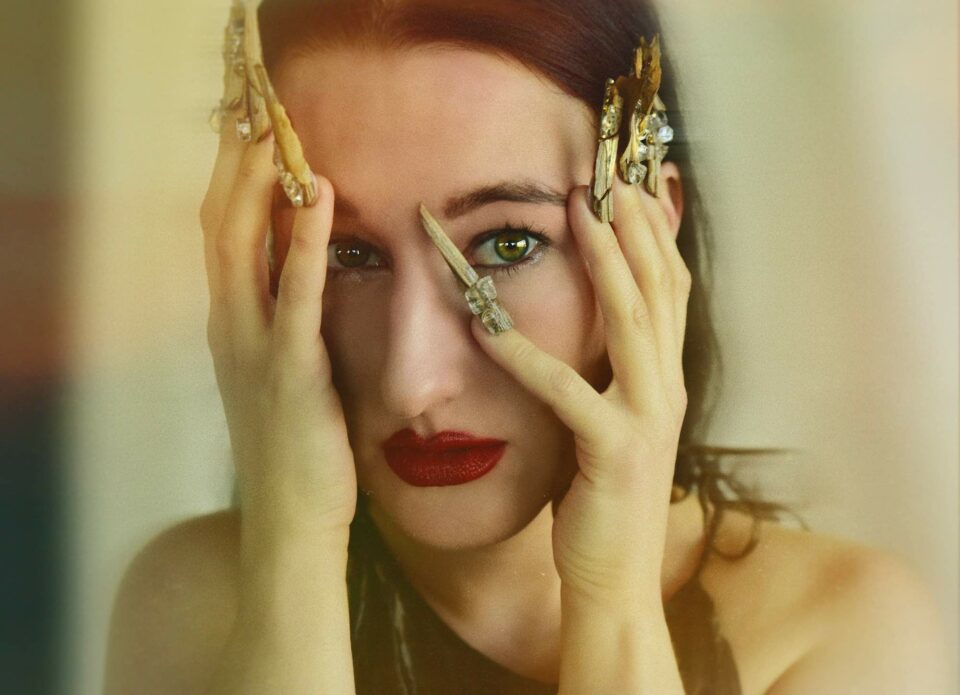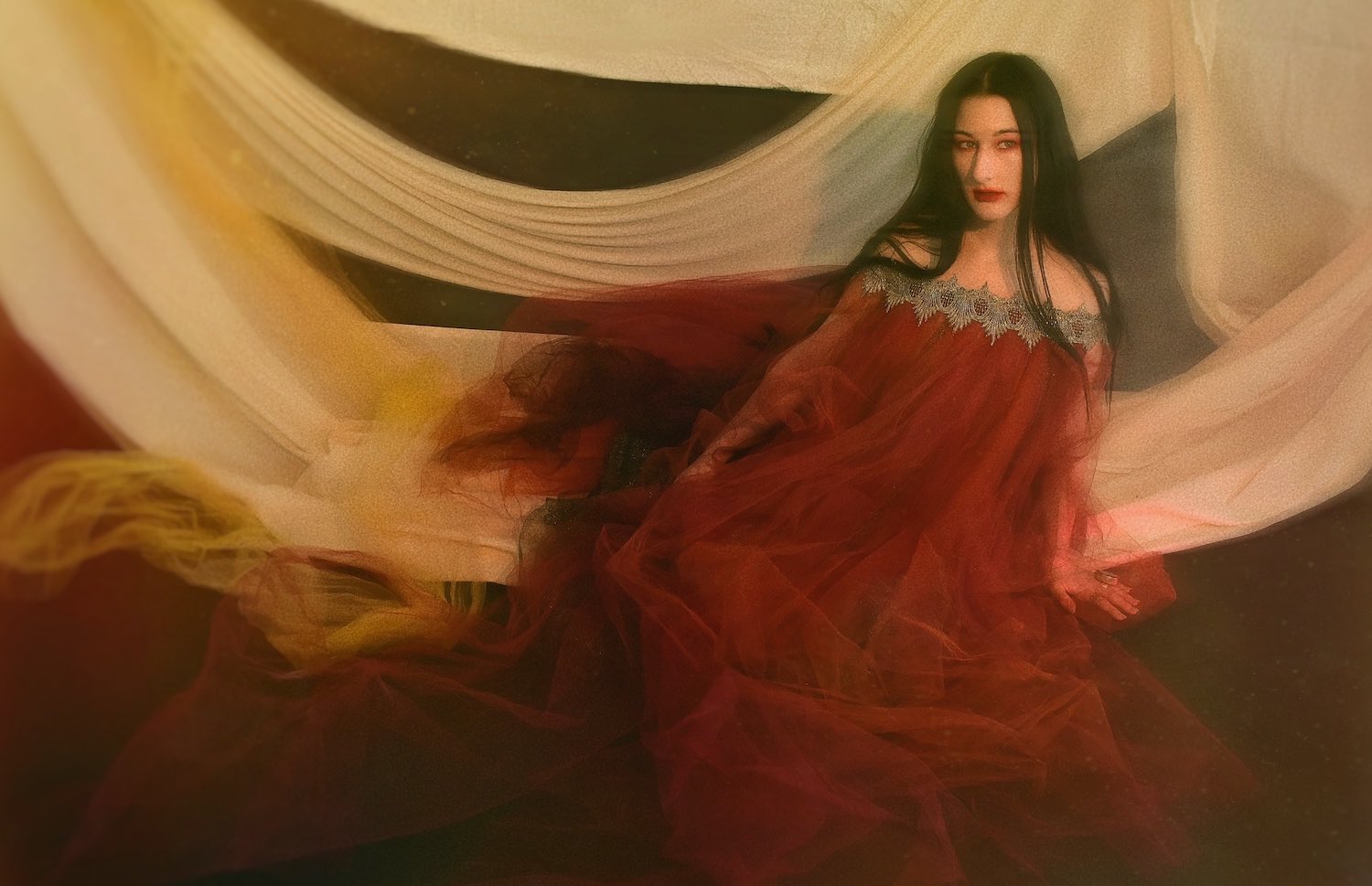Over the past 13 years, Nika Roza Danilova, a.k.a. Zola Jesus, has stamped her distinctive aesthetic across six albums filled with the darkest strains of pop, rock, and electronica. On her latest release, Arkhon, Danilova reached out to some friends to help unlock her best efforts: Drummer Matt Chamberlain (David Bowie, Fiona Apple, Lorde) amplifies the gnostic vibe of the album, while co-producer Randall Dunn (Pallbearer, Wolves in the Throne Room) brings some sharpness and bombast to fill the chamber of sounds.
Arkhon centers on how it’s possible to feel utterly alone even in a massive city like Los Angeles, and how we’re all wrestling with or praying to similar demons and gods. The album’s name comes from an ancient Greek word for ruler, specifically a Gnostic interpretation evoking flawed deities with corrupting power. “The Gnostics believe that the Arkhons are these malevolent forces that mislead humanity to more evil ways, and it keeps them from being able to live in a truly enlightened way,” Danilova explains. “And so I just felt like we’re living in a very Arkhonic time in that way. We have these malevolent rulers, kind of lording over us and trying to corrupt us.”
To celebrate the release of Arkhon and our uncertain times, we spoke to Zola Jesus about her varied touchstones for the new songs, adjusting to massive life changes, and some of her upcoming music plans.
I read that you went through some writer’s block for this record and started reaching out to people you’ve interacted with in the past.
Yeah, I mean, I’ve always worked in a similar way where I write all the songs, and then I’ll come to somebody and say, “Hey, can you help me basically just make these sound better?” But this time, by nature of everything I was going through—I just had really gone through a huge transformational, cataclysmic moment that changed my life, and I kind of had to rebuild from there—it took a long time to actually get comfortable with making music, because I feel like I was getting to know myself in a new way. So that also, I felt, transferred into my writing process where I was like, “Wow, I can’t even write the same anymore, I don’t know who I am.”
“By nature of everything I was going through, it took a long time to actually get comfortable with making music, because I feel like I was getting to know myself in a new way.”
At that time I had just made some friendships with people who were so inspiring and encouraging and believed in me when I didn’t believe in myself, because I was just so overwhelmed and confused, and I didn’t know how to put all of it to song, because it was so raw for me. So working with other people basically allowed me to step outside of what I was experiencing and let other people in. It was healing for me because I was also asking them to basically interpret the most intimate feelings I was trying to express through these songs.
I wanted to speak a little bit about how the record relates to folklore and animism. I’d be curious to hear what your thoughts are on that and what keeps attracting you to those elements.
I moved back to the woods in 2016 after living in the city for several years. And it was a huge moment of reckoning because I was coming back to a place that felt really, really familiar to me, but at the same time, it was like I was choosing nature over society by doing that. I spent a lot of time in my little patch of nature and connected with it. I built a relationship with it in a way that I never had before. And in doing that, I just ended up feeling like my sense of place had changed. I didn’t feel like society gave me anything that nature couldn’t give me.

Then also just everything that’s been going on in the world—I feel more and more that we need to focus on what the fundamental aspects of life are, the most important aspects that provide us the nurturing environment that allows us to survive. I find that the more we turn our backs on nature, the more we turn our backs on ourselves and our survival. So that became a big theme of the record as we’re dealing with the climate crisis and all this political strife and with oligarchs choosing greed over choosing collective action—just feeling like we’re falling so far from the direction we need to be in in order to sustain our species. It’s an overwhelming aspect of what I feel like my values are, at this point in my life.
Were there any particular songs that speak to that theme?
“Lost” is definitely a song that I tried to imbue that energy of challenging us all to think about our sense of place differently or to even just be pissed that we are so lost in this world right now. Some of it’s our doing and some of it’s just the way that history has unfolded. Also, “Stone” is kind of a Gnostic jam to try to wake people up and to encourage them to think in all sorts of directions and ways that they maybe haven’t.
“I find that the more we turn our backs on nature, the more we turn our backs on ourselves and our survival. So that became a big theme of the record—just feeling like we’re falling so far from the direction we need to be in in order to sustain our species.”
I wanted to ask you about “Undertow.” What was the purpose of the progression of that song?
That song changed a lot. It’s actually two songs that we put together. The first thing was a piece that I’d written, a kind of vocals-and-piano thing. And then we blended that with the song “Undertow.” Originally the beat that I’d made was much more of a Zola Jesus sound, for lack of a better term. And so it was this kind of aggressive, more masculine song. But then when Matt laid down drums, he turned it into an R&B kind of jam.
I feel like sometimes my songwriting can be a little impatient. It’s got to be everything going off on all cylinders, all at once. But here I was like, “Let’s just let the groove take the fore and have a song that can be more laid back, smoke some weed, just hang out, enjoy the beat.” It was definitely a moment for me where I was like, “I just want to enjoy listening to the music that I’m making.”
Are there still collaborators or projects you’re itching to do the next time you’re starting to think about the next record?
Oh, always! I mean, I still want to write my own opera, which is something that I’m slowly working on. I want to make an EP with Matt Chamberlain that’s just very experimental. And also just poking and prodding different styles that I’ve been too afraid to. I feel like I’ll never get over wanting to make a great pop record. And I don’t know that I’ll ever do it. I don’t know that I’m meant to do it, but it’s something that I desire. So I’ll keep trying.
Are there any other songs on the record that hold a special place for you in terms of meaning?
Well, because this record is the end result of a very transformative period, a lot of the songs have to do with letting go of control, stepping into the unknown, having faith that things will work out and get better, and dealing with a lot of inner work that needed to happen. The record is quite personal. It’s quite Jungian. It has to do with not only the times we’re in, but encouraging people to think more collectively.
“I want to allow myself time and space to consider what the function of art can be in times that are so challenging, and this record, I hope, can be a beacon of hope for people to get through feeling like we’re living in…just a mess.”
I feel like music these days is so reactive to the moment. It’s not really responding in a way that’s allowed time for meditation on what’s happening and how art can be healing in these times. Because we’re forced to have to make things so quickly and not think about things, because there’s just no time or resources. I want to allow myself time and space to consider where we’re at and what the function of art can be in times that are so challenging. That’s something that’s really important to me, and this record, I hope, can be a beacon of hope for people to get through feeling like we’re living in…just a mess.
I wanted to get a little bit more of the background for “Do That Anymore.”
That song was written during the pandemic—during the protests, during the primary election. I was feeling so overwhelmed, just psychically, that I could barely write music at that point, but I ended up writing this song. It’s a hopeless song in some ways, but for me I feel like it’s more reckoning with the realization that change will not come from top to bottom. Nobody’s listening to us. Nobody actually wants to make things better, at the top, for everybody else.There’s a moment of sadness and grief there, where it’s like the old world is dead, but that we need to start the great work, which is building from the bottom up. And that takes time. It’s hard work. It’s not fun. There’s a lot of resentment about that, as well, but it needs to happen. And so I kind of end [the record] on that note, where it’s like the onus is on us, I guess. You can grieve what’s happening, but the next step is to rebuild. And so I leave people with that. FL








